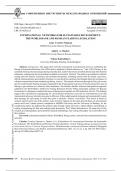СОВРЕМЕННЫЕ ИНСТРУМЕНТЫ МЕЖДУНАРОДНЫХ ОТНОШЕНИЙ
www.volsu.ru
DOI: https://doi.org/10.15688/jvolsu4.2022.5.16
UDC 327(470:100):665.612.2 Submitted: 24.05.2022
LBC 66.4(2Рос),3 Accepted: 01.09.2022
INTERNATIONAL NETWORKS FOR SUSTAINABLE DEVELOPMENT:
THE WORLD BANK AND RUSSIAN FLARING LEGISLATION
Anne Crowley-Vigneau
MGIMO University, Moscow, Russian Federation
Andrey A. Baykov
MGIMO University, Moscow, Russian Federation
Yelena Kalyuzhnova
University of Reading, Reading, United Kingdom
Abstract. Introduction. This paper deals with the international environmental norms on combatting the
flaring of Associated Petroleum Gas (APG) and its adoption by Russia (decrees no. 7 and 1148). Flaring, or the
systematic burning of associated gas during oil production, leads to the release of carbon dioxide and other harmful
substances, endangering the surrounding and global environment. Methods. The authors use qualitative methods
resting upon the analysis of primary and secondary documents, including articles from the media, legal texts,
official communications and scholarly literature, to trace back the conditions that brought about the emergence of
a distinct international norms condemning flaring. Analysis. The analysis of the norm through its life cycle reveals
that the multi-faceted framing strategies employed by the Transnational Advocacy Network allowed the issue of
flaring to gain salience in a relatively short timeframe. The flexible, durable, technical and apolitical approach
adopted by the World Bank’s Global Gas Flaring Reduction Private Public partnership explains the Russian
Government’s willingness to address the issue of flaring and to legislate on APG utilization. Results. The findings
suggest that international campaigning for environmental protection need not be confrontational and that
transnational advocacy networks may gain in efficiency if they adopt targeted strategies and systematically recode
their message for each group of actors they plan to sensitize. Authors contribution. This article is based on
research carried out by one of the authors, Anne Crowley-Vigneau for her dual doctoral thesis on international
norms and Local Content policies completed at MGIMO University and the University of Reading. As the
Crowley-Vigneau A., Baykov A.A., Kalyuzhnova Ye., 2022
coordinating author she gathered the primary data through expert interviews. Andrey Baykov participated in
coding, triangulating the data and studying legal documents. Prof. Yelena Kalyuzhnova, the supervisor of this
research, provided guidance and created the research methodology. The writing of the paper was a joint effort of all
three authors.
Key words: international relations, Russia, World Bank, flaring, norms, constructivism, transnational advocacy
networks.
Citation. Crowley-Vigneau A., Baykov A.A., Kalyuzhnova Ye. International Networks for Sustainable
Development: The World Bank and Russian Flaring Legislation. Vestnik Volgogradskogo gosudarstvennogo
universiteta. Seriya 4. Istoriya. Regionovedenie. Mezhdunarodnye otnosheniya [Science Journal of Volgograd
State University. History. Area Studies. International Relations], 2022, vol. 27, no. 5, pp. 206-218. DOI: https://
doi.org/10.15688/jvolsu4.2022.5.16
206 Вестник ВолГУ. Серия 4, История. Регионоведение. Международные отношения. 2022. Т. 27. № 5
, A. Crowley-Vigneau, A.A. Baykov, Ye. Kalyuzhnova. International Networks for Sustainable Development
УДК 327(470:100):665.612.2 Дата поступления статьи: 24.05.2022
ББК 66.4(2Рос),3 Дата принятия статьи: 01.09.2022
МЕЖДУНАРОДНЫЕ СЕТИ НА СЛУЖБЕ УСТОЙЧИВОГО РАЗВИТИЯ:
ВСЕМИРНЫЙ БАНК И РОССИЙСКОЕ ЗАКОНОДАТЕЛЬСТВО В ОБЛАСТИ
СЖИГАНИЯ ПОПУТНОГО ПРИРОДНОГО ГАЗА
Анн Виньо
Московский государственный институт международных отношений (Университет) МИД РФ,
г. Москва, Российская Федерация
Андрей Анатольевич Байков
Московский государственный институт международных отношений (Университет) МИД РФ,
г. Москва, Российская Федерация
Елена Калюжнова
Редингский университет, г. Рединг, Соединенное Королевство
Аннотация. Введение. В данной статье рассматриваются международные экологические нормы по
борьбе с сжиганием попутного нефтяного газа (ПНГ) и их применение в России (указы Президента № 7 и
1148). Факельное сжигание, или систематическое сжигание, попутного газа во время добычи нефти приво-
дит к выбросу углекислого газа и других вредных веществ, создавая опасность для местной и мировой эколо-
гии. Методы и материалы. Через призму конструктивистской нормативной теории авторы рассматрива-
ют механизмы, ведущие к появлению и распространению международных норм, осуждающих факельное
сжигание ПНГ, а также международные сети, участвующие в продвижении такого способа сжигания ПНГ.
Анализ. Исследуя эволюцию данной нормы на протяжении всего ее жизненного цикла, авторы показывают,
что многоаспектные рамочные стратегии, используемые транснациональной (международной) сетью за-
щиты интересов, позволили проблеме факельного сжигания ПНГ стать заметной в относительно короткие
сроки. Гибкий, долговременный, технический и аполитичный подход, принятый частно-государственным
партнерством Всемирного банка по сокращению факельного сжигания ПНГ, объясняет готовность Прави-
тельства России решить проблему сжигания попутного газа и принять законы об утилизации ПНГ. Резуль-
таты. Полученные авторами данные показывают, что кампании по защите окружающей среды на междуна-
родном уровне не обязательно должны носить конфронтационный характер и что транснациональные (меж-
дународные) сети по защите интересов могут повысить их эффективность, если они примут целевые страте-
гии и правильно сформулируют свои послания для каждой группы субъектов, которых они планируют при-
влечь в такие кампании. Вклад авторов. Статья основана на исследовании, проведенном одним из авторов –
Анн Виньо для ее двойной докторской диссертации по международным нормам и политике местного содер-
жания, выполненной в Московском государственном институте международных отношений (Университете)
МИД РФ и Университете Рединга. Как координирующий автор, она собрала первичные данные посредством
интервью с экспертами. Андрей Байков участвовал в кодировании, триангуляции данных и изучении юриди-
ческих документов. Профессор Елена Калюжнова, руководитель этого исследования, создала его методоло-
гию. Написание статьи осуществлялось авторами совместно.
Ключевые слова: международные отношения, Россия, Всемирный банк, факельное сжигание, нор-
мы, конструктивизм, транснациональные сети защиты интересов.
Цитирование. Виньо А., Байков А. А., Калюжнова Е. Международные сети на службе устойчивого
развития: Всемирный банк и российское законодательство в области сжигания попутного природного газа
// Вестник Волгоградского государственного университета. Серия 4, История. Регионоведение. Междуна-
родные отношения. – 2022. – Т. 27, № 5. – С. 206–218. – (На англ. яз.). –DOI: https://doi.org/10.15688/jvolsu4.2022.5.16
Introduction. Gas flaring went from being international concern in the 2010s as illustrated
a rarely spoken topic and an industry specific by the following quote by World Bank President
phenomenon in the 1990s to a subject of Jim Yong Kim “Gas flaring is a visual reminder
Science Journal of VolSU. History. Area Studies. International Relations. 2022. Vol. 27. No. 5 207




